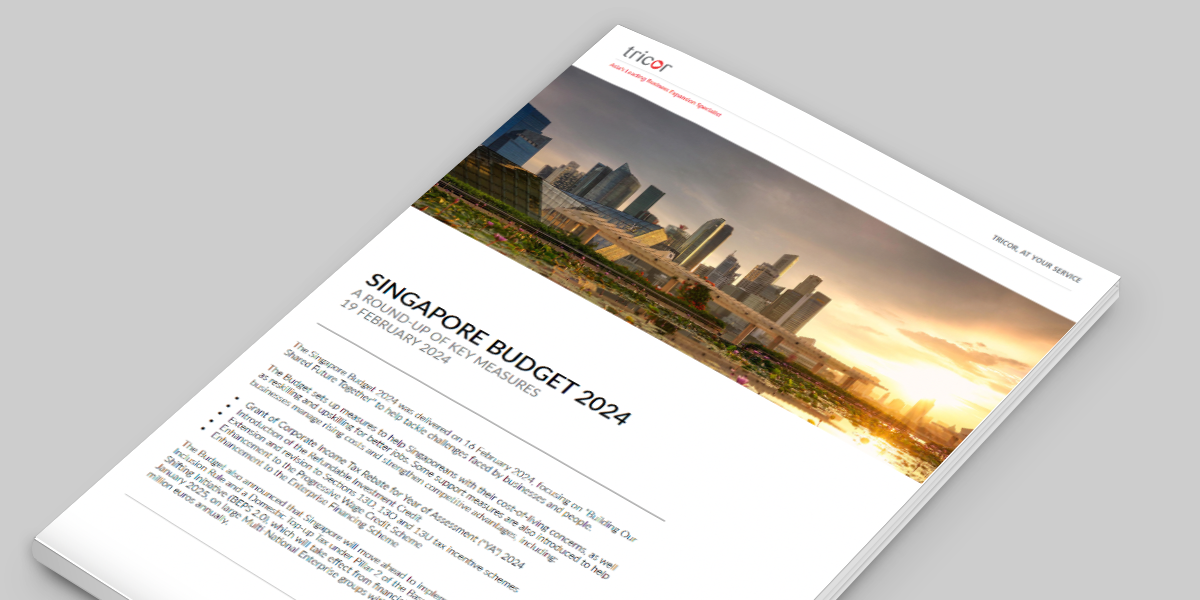The Singapore Budget 2024 was delivered on 16 February 2024, focusing on “Building Our Shared Future Together” to help tackle challenges faced by businesses and people.
The Budget sets up measures to help Singaporeans with their cost-of-living concerns, as well as reskilling and upskilling for better jobs. Some support measures are also introduced to help businesses manage rising costs and strengthen competitive advantages, including:
- Grant of Corporate Income Tax Rebate for Year of Assessment (“YA”) 2024
- Introduction of the Refundable Investment Credit
- Extension and revision to Sections 13D, 13O and 13U tax incentive schemes
- Enhancement to the Progressive Wage Credit Scheme
- Enhancement to the Enterprise Financing Scheme
The Budget also announced that Singapore will move ahead to implement the Income Inclusion Rule and a Domestic Top-up Tax under Pillar 2 of the Base Erosion and Profit Shifting Initiative (BEPS 2.0), which will take effect from financial year starting on or after 1 January 2025, on large Multi-National Enterprise groups with global revenue of at least 750 million euros annually.
FORGING AHEAD TO STIMULATE ECONOMIC GROWTH
The Budget 2024 presents numerous benefits and opportunities for Singaporeans and companies operating in Singapore. Our already appealing corporate tax rate of 17% is further bolstered by the Corporate Income Tax Rebate, allowing companies to enjoy 50% tax rebate of up to S$40,000 in YA2024. Even non-profitable companies stand to gain, as they become eligible for the CIT Rebate Cash Grant of S$2,000 if they have employed at least one local employee with CPF contribution in 2023.
The extension of the Sections 13D, 13O, and 13U Tax Incentive Scheme until 31 December 2029 brings immense relief to businesses currently enjoying the incentives. A welcoming news indeed for prospective applicants! This underscores the Government’s commitment to promoting Singapore as a global financial hub for Asset Management Companies and High Net Worth Families. These incentives encompass tax exemptions on specified income from designated investments, withholding tax exemptions on qualifying payments made to non-residents, and GST remissions on relevant expenses. Notably, Singapore-registered Limited Partnerships, previously only eligible for tax incentives under the more stringent Section 13U scheme, can also apply for the Section 13O tax incentive effective 1 January 2025, which imposes lower requirements on assets under management.
The Government’s implementation of Pillar 2 of BEPS 2.0 is bound to result in an increased tax burden for numerous MNEs, especially those currently benefiting from tax incentives in Singapore. Many MNEs are reassessing their plans and strategies, taking into consideration the available incentives and promotions offered by various jurisdictions. Taking cognizance of this, the Government introduced the Refundable Investment Credit, which offers enticing tax and cash rebates aimed at attracting new investments, fostering research, and stimulating innovation activities in Singapore. MNEs and businesses should therefore stay tuned for additional information to be unveiled by EDB by the third quarter of 2024.
Recognizing the significance of local businesses, the Government continues to support them by enhancing funding through the Enterprise Financing Schemes. These initiatives, in conjunction with the SkillsFuture Enterprise Credit and other existing schemes, provide local businesses with access to a variety of customized schemes tailored to their unique needs and circumstances. This support is instrumental in enabling the sustainability and expansion of their operations, thereby fostering their growth and development. Businesses should consider tapping into the various support schemes where applicable.
CONTACT OUR SINGAPORE TEAM
|
Tan Eng Hock
Senior Tax Manager, Tricor Singapore
|
Jessica On
Director, Tricor Singapore
|






